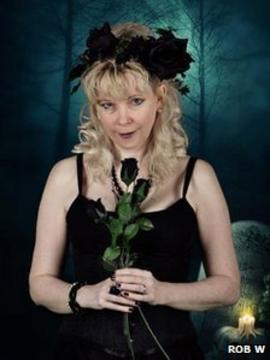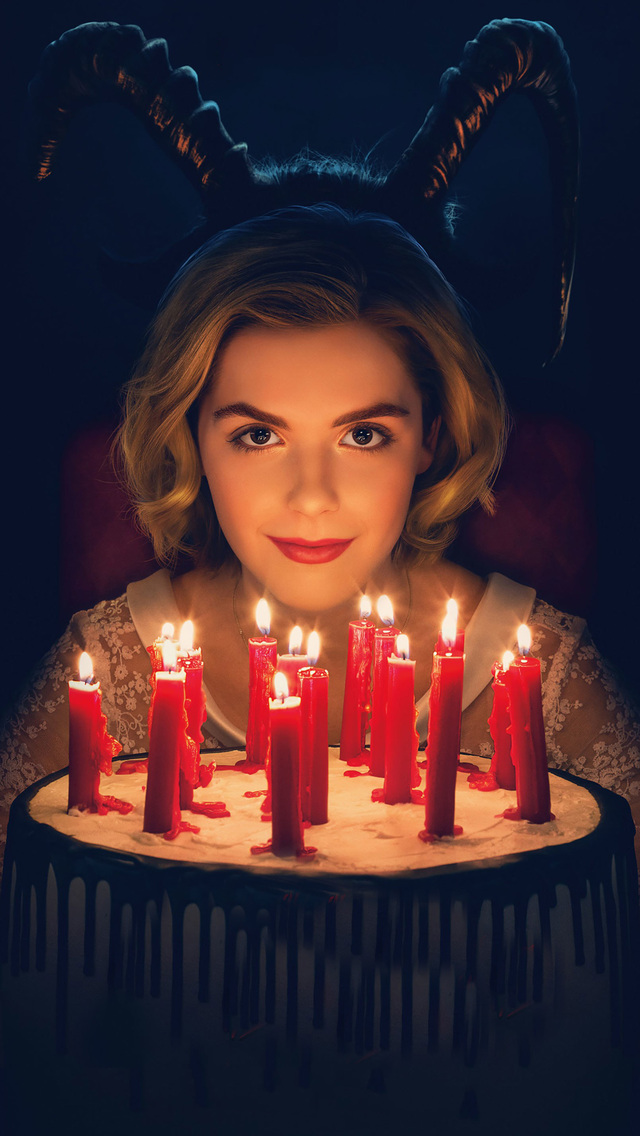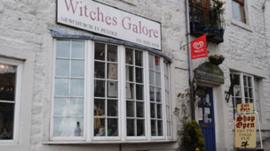As just one small marker of the embracing of the programme, a Buzzfeed survey of almost 100,000 people placed ‘The Chilling Adventures of Sabrina’ as the most popular new drama series of the year. The survey also found it to be the most popular Netflix original series of the year, suggesting widespread acceptance of the occult amongst young adults and teens. Reportedly the program includes cannibalism, but whether this is conveyed as morally right and wrong I can’t say. “[W]hatever is true, whatever is honourable, whatever is just, whatever is pure, whatever is lovely, whatever is commendable, if there is any excellence, if there is anything worthy of praise, think about these things.” (Philippians 4:8).
Sabrina’s reincarnation coincides with that of ‘Charmed’ — a 90s series about three sisters who are witches. Both programmes have been greeted with tremendous excitement. Nothing surprising about this, of course. We grew up with Harry Potter, as well as ‘The Worst Witch’ and other media celebrating witchcraft. Disney and many more stories suggest that witches are dangerous — but I’m certain that JK Rowling has done much to convince my peers of witchcraft’s virtues.
“Woe to those who call evil good and good evil…” (Isaiah 5:20)
If this social trend in popular perceptions of witchcraft is clear enough, less clear is how many people are progressing from that into identifying as witches or practising witchcraft. A Newsweek article in November declared, “Number Of Witches Rises Dramatically Across U.S. As Millennials Reject Christianity,” but the article failed to provide a reference to the data that it claims this assertion is based on (“religious studies from Trinity College, Connecticut,” seem not to be online), and the Media Research Centre argues that Newsweek’s claim is unwarranted.
Ultimately, the religious label that a person chooses to wear when surveyed doesn’t necessarily provide clear insight into their beliefs and practices. For decades, almost ten times as many British survey participants have labelled themselves as Christian as read the Bible and attend Church. As MRC suggests, Witchcraft is increasingly considered not to be evil (as it previously was), but instead to be a resistance movement aimed at supposed good. Witches were, until (relatively) recently, the villains of stories, with the word ‘witch’ itself frequently being used to refer to any unkind female. Now, those who identify as witches believe themselves to be noble warriors against social injustice — particularly The Patriarchy, which they blame in no small part on Christianity. Consequently, when surveyed regarding their religion, some might answer that they are Wiccan or Pagan whilst in fact not participating in the practices.
Nevertheless, Quartzy’s claim that Pew Research data has found that 1.5 million Americans identify as Wiccan or Pagan is disturbing. Whether casting spells or not, these individuals are rebelling against Christianity — likely their own misinterpretation of it based on negative aspects of its history, but ultimately against the Gospel itself. This is a tragedy. Here in Britain, the Office for National Statistics found that 57,000 people identified as Pagan and 39,000 as Spiritualist in 2011.
This community of occultists remains cloistered, yet inklings occasionally appear from mainstream media sources, such as the “Secret life of modern-day witches” from the BBC in 2012 which interviews witches in Lancashire. One “runs her own witch school and has taught more than 60 witches,” claiming, “We never do nasty spells. They’re always so life takes a better turn.”
Percolating through numerous mainstream news outlets across the pond earlier this year was the story that Sephora, a prominent cosmetics brand, had advertised a “Starter Witch Kit.” It was soon removed from sale due to public outcry — not that the public are unsettled by witchcraft, but rather that the kit was considered heinous cultural appropriation.
Yet there’s certainly plenty of money in the occult merchandise industry. Buzzfeed’s “How Witchcraft Became A Brand” last year spotlighted spiritual item subscription boxes — that is, subscribers paying monthly to receive a surprise selection of tea, crystals, aromatherapy and “spiritual growth tools” by post. Buzzfeed spoke to the owner of Goddess Supplies, which, at a cost of $30 monthly, increased its subscriber base from 300 to almost 6,000 in 18 months; today, its site boasts having featured in extremely widely read magazines, including Refinery29, Glamour, People and Elle. Etsy, which I’d already read is a hot spot for witches, is said by Buzzfeed to offer 28,000 results for the search term Witchcraft — but upon searching the site for Witchcraft today, less than 17 months later,[1] I’m returned over 44,000 items. Of course, there are plenty of witch-related items that simply don’t have Witchcraft in their title or tags. I’m struck by the numerical evidence of rapid growth. Items include T-shirts and jewellery — but many of the listings are for trinkets purporting to have magical powers. It bemuses me that so many would wish to spend money on entirely unscientific tools; I’m quite sure that many others would deem this a laughable superstitious con — some may be literally snake oil. The high number of listings is in spite of Etsy apparently causing uproar by banning listings of spells two years previously. Despite the reduction in sales the ban will have caused, from its imposition onwards, Etsy saw growth in witch related purchases increase almost 60% over the subsequent two years.
“For where your treasure is, there your heart will be also.”Matthew 6:21
The same article also claimed that more than half of young adults in the U.S. believe astrology is a science — but it’s unclear whether this includes those who mistakenly confuse astrology with astronomy. In a discussion with another spiritual subscription box seller, the piece quotes that “she says she’s seen a 75% increase in her audience in the past year,” and references an astrology app, Co-Star, which crashed three times in its premier week due to excess of demand.
No niche apps are necessary for those wishing to explore witchcraft of course — the conventional, most widely used apps are rife with Paganism also. Reports repeatedly reference Instagram, where, for example, #witch today returns 7,271,165 posts — almost twice the 3.7 million that Buzzfeed refers to in their aforementioned article of a year and a half earlier.
Stylist (distributed freely to commuters) wrote two years ago that, “Some white witches now cast emoji spells,” and offered readers suggestions to “infuse your daily routine with these magical practices, which may or may not work…” — including a Fertility spell and “Career crystal.” Earlier this year, the magazine sought to enlighten readers as to “Why it’s time to awaken your inner witch,” claiming that Tarot “cards guide you on solutions and a better sense of self-awareness, as opposed to the Yes, No, Ask Again Later advice of a Magic Eight Ball…. Magick is a way for us to weave meaning into our lives.” This is at once laughable, disturbing and tragic. One is duty bound to ask why people are so dismissive and/or unaware of the rational belief to be had in Christ, that they feel somehow comforted or empowered by pieces of stiffened paper? Have they considered that they might simply be being conned into spending on magical merchandise? How do they understand failed spells and predictions, without having the trust in a God who knows better than we do? Those pursuing Paganism are in rebellion against God — as we all were (Romans 3:23) — but at the same time, they’re engaging with the occult because they’re spiritually thirsty. Their misunderstanding of Christianity means that they’re unaware of the thirst-quenching offered to them in the Gospel.
Vice regularly champions witchcraft, as well as offering readers ongoing diagnoses of their star signs — oddly juxtaposed with some high calibre journalism (* that is to say, some of its other journalism is high calibre, there are also many varieties of folly aside from spiritualism). 2015’s “The Trials of Being a Witch Today” reflected upon historical persecution of those accused of witchcraft, and argued that, “Although women are no longer put to death for their magical powers, many still face prejudice in today’s society.” One interviewee, we were told, “was in primary school when she first found paganism.” This is a startling remark. I can’t help but wonder whether the girl was influenced by bullying, by a tumultuous home life, or by childhood fiction. She recounted being “told by a preacher that I was going to go to hell after he noticed my pentacle… as I walked past him to give a homeless man a cup of tea and a pasty because it was a cold afternoon. I found it rather ironic that I was told I was going to hell when I was clearly trying to help another in need.” Whilst a comment like this should not for a minute be regarded as anything like persecution, the anecdote should remind us as Christians to be thoughtful in how we interact with those following dangerous spiritual paths. She now “truly believe[s] children should be taught about paganism in schools as it would help to promote a better understanding of what it’s about.”
Another witch in the same article recounts, “I was cornered and attacked in the toilets by a group of girls, who called me a Satanic bitch.” From this she argues that “the law desperately needs changing as we should be better protected by the [Criminal Justice Act 2003], and being able to put our belief on the census as an ‘official’ religion would be an amazing start.” We aren’t offered any data regarding attacks on witches, and conclusions can’t be drawn from a single anecdote; it is vital, however, that in opposing witchcraft, we make clear that we don’t condone any such abuse (since non-Christians will all too readily blame Christianity for discrimination). The account serves as a reminder that whilst paganism is one demonstration of an attitude that rejects God, many others reject God also: the person who violently attacks a witch is just as much in need of the salvation Jesus offers, as the witch herself is.
But will the census and the national curriculum ever include witchcraft as this witch suggested? It will presumably depend on whether the upward trend in their numbers continues. That seems plausible. Some data suggests an increase in Wicca of 1675% in just one decade between 1990 and 2001. Rather than this being a passing trend, almost two decades later the movement is flourishing, and highly popular screen depictions such as Sabrina and Charmed will prime the next generation. A Buffy reboot is reportedly in the works, along with a series adaptation of ‘His Dark Materials.’ Harry Potter may have finished at Hogwarts, but the franchise is still luring in young readers as well as continuing to entrance the millennials who grew up with it.
Whilst paganism is not yet an option on the census, another indicator suggests that society is shifting in that direction. The British Armed Forces have just initiated “the Defence Pagan Network.” This was highlighted in Spiked’s recent opinion piece “Spare me this Pagan Revival,” in which Julie Burchill bemoans the fact that “it’s been quite a year for pagans,” referencing their demand for prison chaplains and ‘Thought For The Day’ slots on Radio 4. She puts forward the interesting proposition that “these days the occult has to some extent taken the place of sex for the notoriously chaste Generation Z,” though she also acknowledges that since paganism is saturated with sex, “such people are generally perverts, and not even sexy ones.” Refreshingly, she promulgates the value of Christianity as a force for good in society — but millennial media voices seem not to see this.
 Another of Vice’s many features on witchcraft declared in January 2018,
“Long stigmatized by colonizers and the Catholic Church, indigenous
forms of spirituality and witchcraft are experiencing a renaissance
among Latinx[2]
millennials,” and several others have gleefully reported on an apparent
movement by some African Americans to unshackle themselves from the
supposedly oppressive Christianity that was imposed on their enslaved
ancestors by immersing themselves in African tribal witchcraft. Perhaps
the lesson of this is that, as Christians, we need to be more forthright
and forceful in denouncing racism, even if not personally responsible
for the accusations made by anti-Christian sources.
Another of Vice’s many features on witchcraft declared in January 2018,
“Long stigmatized by colonizers and the Catholic Church, indigenous
forms of spirituality and witchcraft are experiencing a renaissance
among Latinx[2]
millennials,” and several others have gleefully reported on an apparent
movement by some African Americans to unshackle themselves from the
supposedly oppressive Christianity that was imposed on their enslaved
ancestors by immersing themselves in African tribal witchcraft. Perhaps
the lesson of this is that, as Christians, we need to be more forthright
and forceful in denouncing racism, even if not personally responsible
for the accusations made by anti-Christian sources.The extent to which some modern withes believe themselves to be morally superior was evidenced this summer when dozens of them gathered together to place a hex on Brett Kavanaugh as he was awaiting confirmation to the Supreme Court. One organiser remarked, “[We see] the witch as a political figure who threatens and works to take down the patriarchy. This has been seen throughout history, but more recently in American society. We uphold this legacy which merges art, political theatre, religious iconology and socio-political resistance.”
A decade ago, Richard Dawkins and co. confidently asserted that belief in the supernatural was on its death bed. Would they have foreseen gatherings of witches making international news?
Nevertheless, amongst what we might lump together as ‘modern paganism,’ there are those who are in fact atheists. I refer to members of the Satanic Temple, an organization which recently sued the makers of the Sabrina reboot for its appropriation of their deity. I was struck, last year, by a Vice report, in which members of the Satanic Temple explained that Satan is, to them, a symbol of rebellion, rather than a supernatural being. Their site lists “seven fundamental tenets,” including, “One should strive to act with compassion and empathy towards all creatures in accordance with reason” — though others highlight the threatening nature of the organisation — “The struggle for justice is an ongoing and necessary pursuit that should prevail over laws and institutions.” Whilst positive in theory, will clearly lead to fervent protests; “One’s body is inviolable, subject to one’s own will alone,” is a staunch pro-abortion proclamation (as the footage I’d seen demonstrated). “The freedoms of others should be respected, including the freedom to offend,” is an unashamed declaration of intent to attack Christianity; and, “To wilfully and unjustly encroach upon the freedoms of another is to forgo one’s own,” evidences their belief that they are entirely justified in doing so.
Meanwhile, the separate Church of Satan proclaims on its site that “Satanists are atheists…. Our position is to be self-centered”. It states that Satanism is “not congruent with any other philosophy or religion which endorses the belief in supernatural entities — inc. Wicca and Voodoo.”
Ironically, there is active occult practice alive within the Anglo-Catholic Church, according to a Church Times piece in December.
We have vital lessons to learn through this grotesque trend. Whilst we pray against the forces of the occult, we must remember that “rebellion is as the sin of divination” (1 Samuel 15:23) — humanity is not a binary of Godly and pagan, we must each continually repent of our sin and seek God’s help, without allowing ourselves to feel righteous because of the erroneous spirituality we see around us. It would be wrong to endorse any spirituality other than the Holy Spirit — but we must avoid demonising the misguided individuals ensnared by this evil, recognising that most are driven by frustration with historical injustices which were also antithetical to Christ’s command. With God’s guidance, we may be used by Him to steer some of those who are hungry for the supernatural towards the true bread from heaven.
[1] This observation was made in November 2018; doubtless the figures have risen still more since then.
[2] For the confused reader: this is a term intended to avoid the gender bias inherent in the masculine word ‘Latino.’


No comments:
Post a Comment